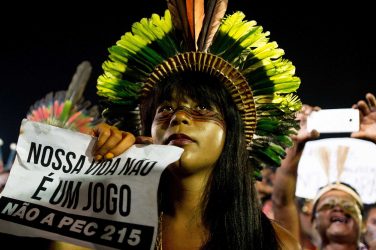 The first round of municipal elections in Brazil having transpired with no major incidents, results show that 27 municipalities in the country (18 of which capital cities) now await a second round of vote for mayor, to be held on October 30.
The first round of municipal elections in Brazil having transpired with no major incidents, results show that 27 municipalities in the country (18 of which capital cities) now await a second round of vote for mayor, to be held on October 30.
Seven of the 20 current mayors managed to be reelected in the first round in the capitals Boa Vista, Salvador, Teresina, Rio Branco, Natal, Palmas, and João Pessoa.
The current mayors of Manaus, São Luís, Recife, Fortaleza, Macapá, Vitória, Maceió, and Belém will now face their opponents in the second round. Winners swear in on January 1, 2017.
In São Paulo, Brazil’s largest city, candidate João Doria Jr, of the Brazilian Social Democracy Party (PSDB), the main opponent of the Workers’ Party (PT), of which former Presidents Lula and Dilma Rousseff are members, won in the first round, with a vote count of 3,085,187 (53.29% of valid votes), followed by current mayor Fernando Haddad (with 16.70%), of the PT.

In a statement, Doria Jr expressed his gratitude, and pledged to dedicate his government to the poorest. He acknowledged the role of Operation Car Wash in his victory, and said his election shows “new winds” in Brazilian politics.
In Rio de Janeiro, Brazil’s second biggest city, candidate Marcelo Crivella, a right-wing senator and an evangelical bishop at Igreja Universal, is set to face Marcelo Freixo in the leftist Mudar é Possível (“Changing Is Possible,” in a literal English translation) coalition. Crivella got 27.76% of the valid votes, and Freixo 18.31%.
The main change observed in the first round of elections in 2016 compared to 2012 was the performance of the PT, which failed to come to par with the PSDB in the capitals. In 2012, the two parties were balanced.
This year, the PT managed to reelect in the first round only the mayor of Rio Branco, capital city of the small state of Acre. The PSDB, in turn, in addition to taking eight hopefuls to the next round, rose the number of elected mayors in the first round.
As for gender, of the 36 women who competed in the election for mayor in the capitals, one succeeded in winning the first round: Teresa Surita, also reelected in Boa Vista, Roraima. Surita was also the candidate with the highest percentage of votes. A decisive factor in her performance, she argues, was the reduction in campaigning costs brought about by the new law, approved last year.
Temer on High Abstention
Brazilian President Michel Temer said Monday in Buenos Aires that the high abstention rate in the municipal elections held Sunday (October 2) serves as a message from the population to the political class in Brazil.
In his view, this should be taken into account so that politicians and parties review “possible inappropriate habits” in Brazilian politics.
“There’s definitely a feeling of disappointment towards the political class in general. You can’t say it’s party A or B in particular. We have 35 parties in the country, nearly all of them with candidates for mayor. Nonetheless, abstention was significant,” said the president after meeting with Argentine President Mauricio Macri.
Temer, however, stressed that, despite the abstentions, the municipal elections represented the exercise of democracy: “I think it was a message given by the ballot in two fronts, the first of which being that those in the political class should beware. On the other hand, we must celebrate the democracy formed over the course of time, which was exercised in yesterday’s elections,” he added.
Peaceful
The first round of Brazil’s municipal elections, held this Sunday, happened “in a regular and peaceful atmosphere,” said Supreme Electoral Tribunal (TSE) President Justice Gilmar Mendes.
Despite noting that the elections happened in a tranquil way, Mendes expressed concern over attacks on polling stations in the capital of Maranhão, and on incidents reported in Rio de Janeiro.
However, the justice said the attacks are not related to the electoral period “but, most likely, to the organized crime in a general context”.
At the same press conference, Defense Minister Raul Jungmann released the final numbers of the armed forces operation in the elections. According to the minister, 25,200 officers were sent to 498 locations in 17 states. In the 2012 municipal elections, officers had been sent to 477 towns.
ABr



